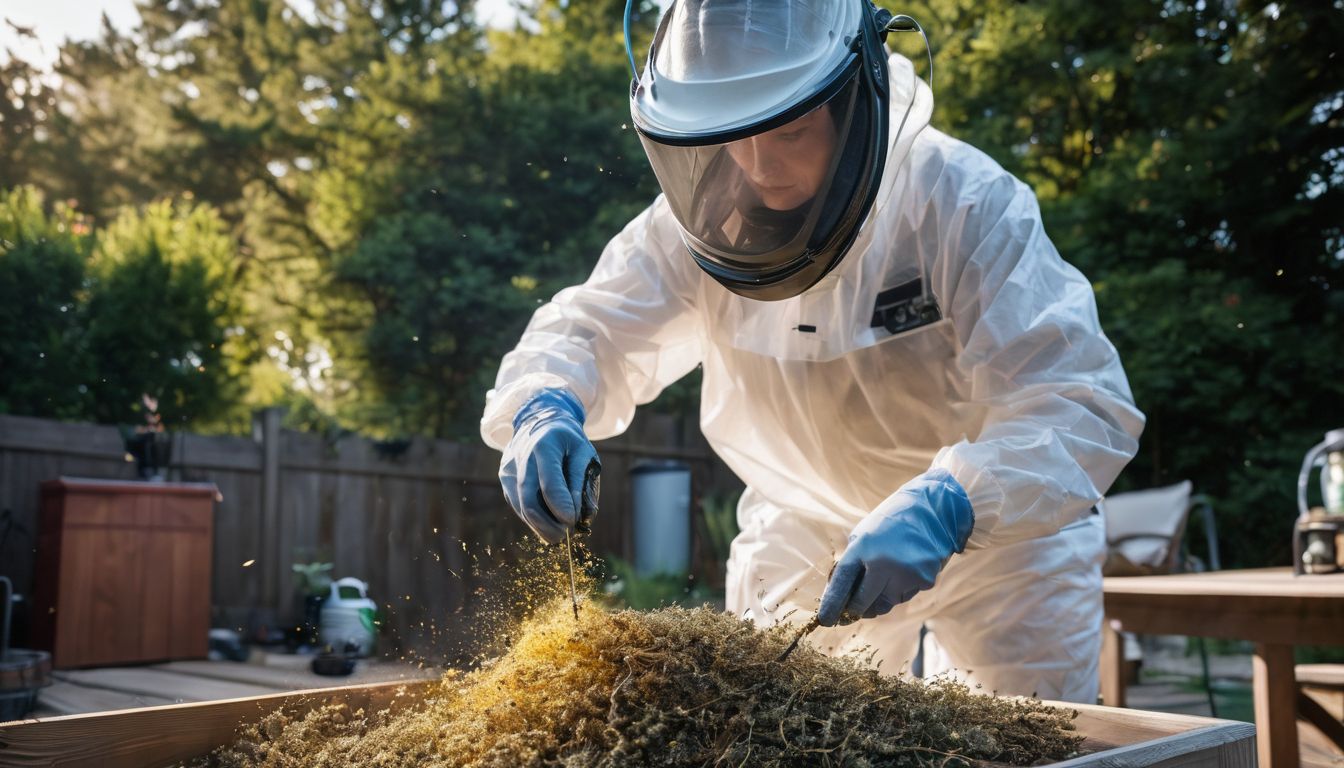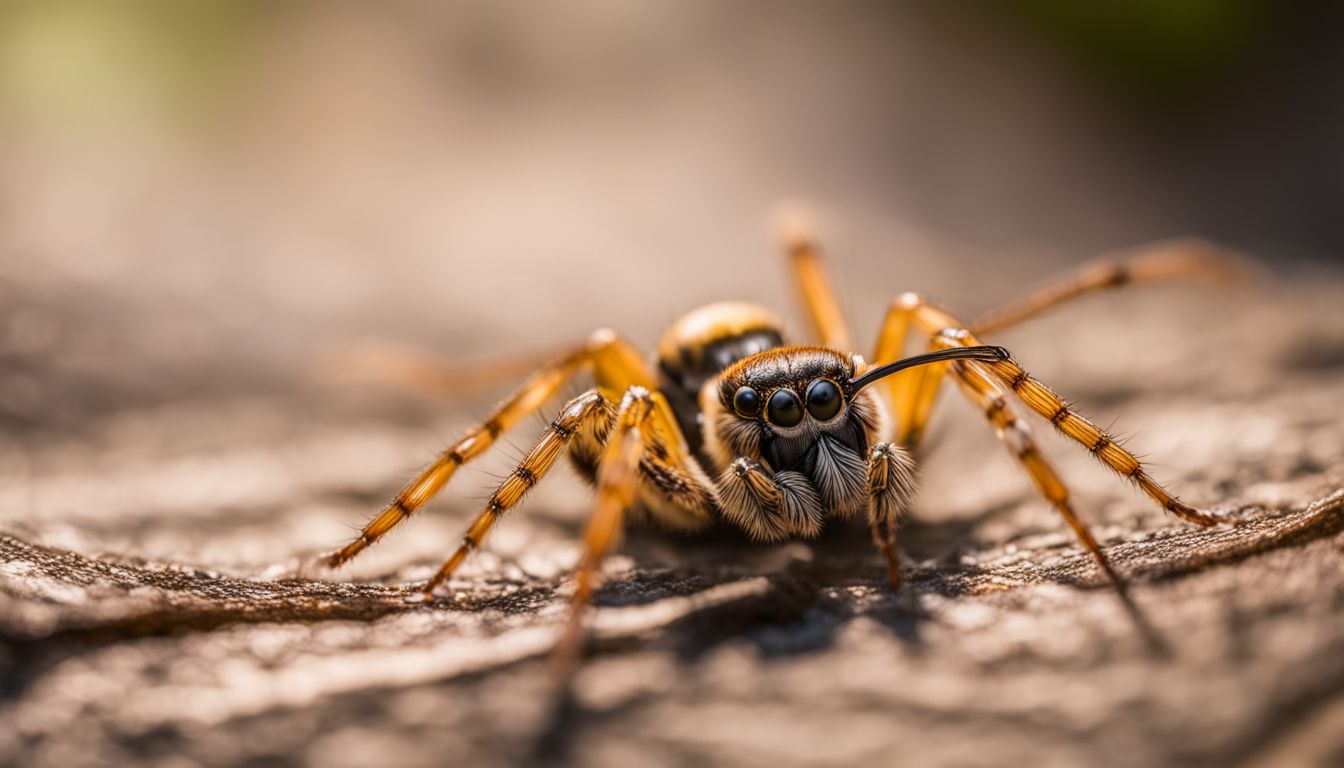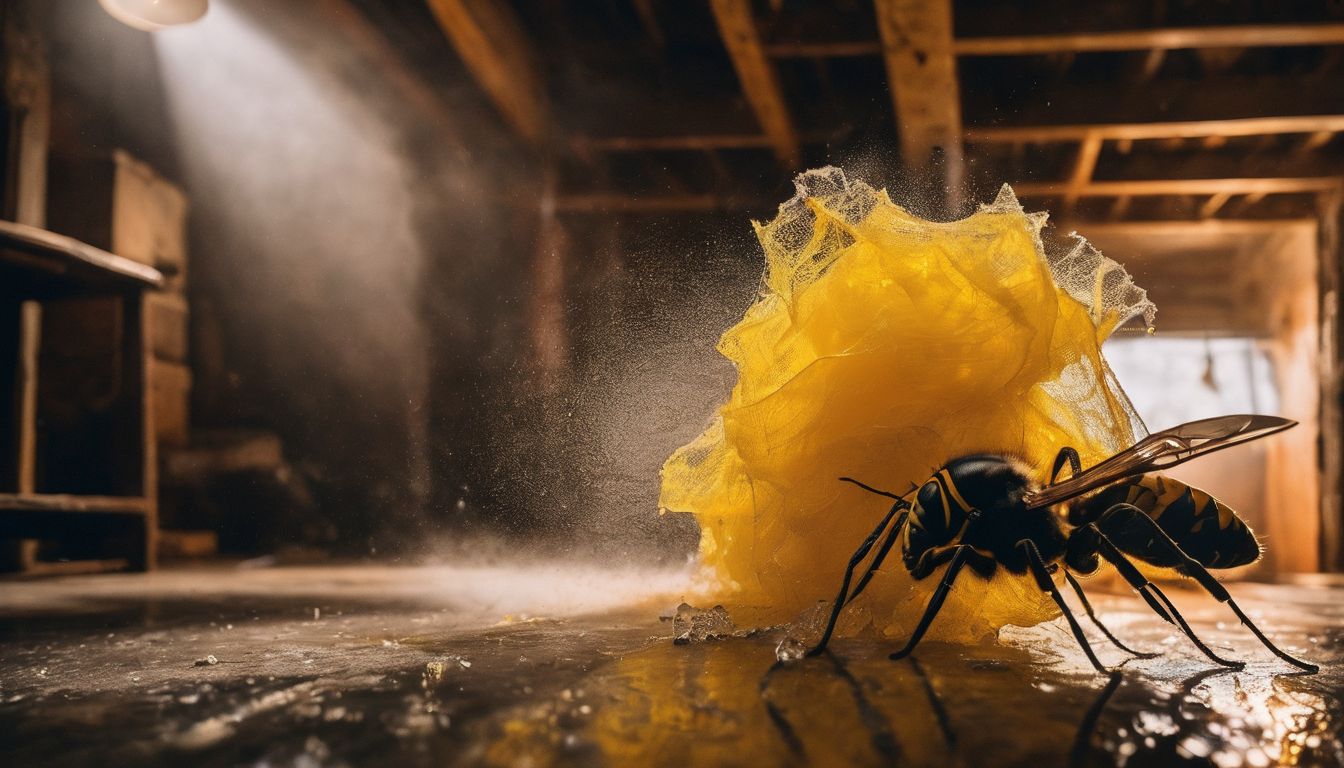Many homeowners worry about pests, and spiders can be particularly unwelcome guests. While wasp spray is a common tool in the battle against flying insects, its impact on spiders may surprise you.
This article will delve into whether these sprays are effective against our eight-legged friends and explore safer alternatives for keeping them at bay. Keep reading to uncover the best ways to tackle unwanted arachnids!
Key Takeaways
- Wasp spray can kill spiders, but its effectiveness is limited due to the anatomical differences between spiders and insects.
- Using wasp spray indoors poses risks as it may harm humans and pets if accidentally ingested or inhaled.
- Safer and more effective alternatives for spider control include spider – specific insecticides and natural preventative measures like essential oils and vinegar sprays.
- Understanding the lifespan of different spider species is crucial for developing long-term control strategies.
Understanding Wasp Spray Ingredients

Wasp spray contains ingredients called pyrethroids, which are commonly found in insecticides. These chemicals target the nervous system of insects, effectively paralyzing and killing them upon contact.
The Role of Pyrethroids in Insecticides
Pyrethroids play a big part in fighting bugs. They are strong chemicals found in many sprays you buy to keep pests away. These include the wasp sprays people use to protect their homes from stinging pests.
Pyrethroids work well because they attack the nervous system of insects like mosquitoes and wasps, which stops them from moving or breathing.
These chemicals come from pyrethrins, which are natural bug killers made by chrysanthemum flowers. But when scientists make pyrethroids, they tweak them to last longer than natural pyrethrins.
This means that when you spray them, they keep working for more time. Even though they are helpful, we have to be careful with pyrethroid insecticides because they can also harm animals and humans if not used right.
Now let’s see how spiders and wasps differ inside their bodies.
The Anatomical Differences Between Spiders and Wasps

Spiders and wasps have different respiratory and circulation systems due to their anatomical differences, which can impact the effectiveness of using wasp spray on spiders. To learn more about how these differences affect pest control, keep reading!
Respiration and Circulation Systems in Arachnids versus Insects
Arachnids and insects breathe in very different ways. Insects like wasps use a bunch of little tubes called tracheae to get air directly to their muscles and other body parts. This system does not mix with their blood.
Spiders, though they may have some tracheae, mostly rely on book lungs for breathing. Air goes into these special lungs and moves oxygen into the spider’s blood.
Spiders also have a unique heart that pumps their blood around their bodies in one main loop. But for insects, it’s less complex; they don’t even have veins like spiders do! Insect blood kind of just sloshes around inside them, touching all their insides to keep them alive.
This means if you’re using bug sprays meant for wasps on spiders, it might not work the same way because of these differences in how they live and breathe.
Can Wasp Spray Effectively Kill Spiders??
Despite its effectiveness in killing insects, using wasp spray to kill spiders may not be as reliable. The anatomical differences between spiders and wasps can impact the spray’s effectiveness on arachnids.
The Impact of Wasp Spray on Spiders
Wasp spray might seem like a strong weapon against spiders. But these sprays are made for bugs with different bodies, like wasps and hornets. Spiders have unique breathing systems that make most wasp sprays less effective on them.
If you spray a spider directly, it could kill it, but this doesn’t help much with other spiders hiding around your house.
Using wasp spray inside your home can also be risky. It’s not safe for places where people live because the chemicals are too strong and not meant for indoor use. Also, just spraying here and there won’t stop more spiders from showing up later.
You need to get rid of things that attract spiders or block their way in if you want to keep them out for good.
Limitations and Risks of Using Wasp Spray on Spiders
While wasp spray can kill spiders, it is not specifically designed for that purpose. Using wasp spray on spiders poses risks as the ingredients in the spray may be harmful to humans and pets if accidentally ingested or inhaled.
Additionally, spraying wasp killer indoors can be dangerous due to its aerosol nature and potential contact with surfaces where food is prepared or children play.
Furthermore, using raid hornet spray indoors for spider control is ineffective and unsafe. The misuse of insecticides like raid hornet spray can lead to poisoning, particularly when used in enclosed areas without proper ventilation.
Safer and More Effective Alternatives for Spider Control
Consider using spider-specific insecticides or natural preventative measures like essential oils to control spiders in your home. These alternatives are safer and more effective than using wasp spray on spiders.
Recommended Spider-specific Insecticides
Talstar Professional is a spider spray that kills spiders on contact.
Natural and Preventative Measures
After understanding the use of spider-specific insecticides, it’s also essential to consider natural and preventative measures for spider control. Here are some effective ways to keep spiders away:
- Use a mixture of dish soap and water as an effective spider repellent.
- Essential oils like peppermint, lavender, or tea tree oil can be used to deter spiders.
- Vinegar spray can help in keeping spiders at bay around the house.
- Place conkers, also known as horse chestnuts, strategically to naturally repel spiders indoors.
Understanding Spider Lifespan and Control
Jumping spiders, for example, have a lifespan of about 1 year, while other species can live up to several years. Understanding the lifespan of different spider species is crucial in developing effective control and prevention strategies.
How Long Do Jumping Spiders Live??
Jumping spiders can live for up to three years when they are kept in captivity. In the wild, their lifespan is an average of six months to a few years, depending on various factors such as predators, food availability, and environmental conditions.
These small creatures are known for their impressive jumping ability and keen eyesight.
Understanding the lifespan of jumping spiders can provide insight into how long-term spider control methods may be needed. It also sheds light on the importance of considering alternative solutions to manage these fascinating arachnids effectively.
Conclusion
In conclusion, wasp spray can kill spiders, but it’s not always effective. Wasp sprays have different chemicals that may harm spiders when sprayed directly. However, using wasp spray indoors can be dangerous.
There are safer and more effective alternatives to control spiders without relying on wasp sprays. It’s important to explore spider-specific insecticides and natural preventive measures for better spider control.
To learn more about the lifespan of these intriguing arachnids, read our detailed guide on how long jumping spiders live.
FAQs
1. What is in wasp spray that can kill spiders?
Wasp sprays contain chemicals like cypermethrin and prallethrin that can poison spiders, including venomous ones like the brown recluse and black widow.
2. Can I use wasp spray on all kinds of spiders?
Yes, you can use it on many types of spiders, but be careful because these sprays are made for flying insects like wasps and may not be the best choice for every spider or household pest.
3. Will wasp spray stop a spider from biting me?
If you spray a spider with enough wasp spray, it should keep it from moving or biting since the chemicals affect their nervous system and respiratory organs.
4. Is there a natural way to keep spiders away instead of using sprays?
Sure! You can try natural repellents that don’t have harsh chemicals to keep spiders out of your home without harming them or risking your health.
5. Could I hurt other animals if I use too much wasp spray on spiders?
Using lots of wasp spray could harm pets, people, and even helpful bugs around your house, so always follow directions and only use what you need to handle the problem.




